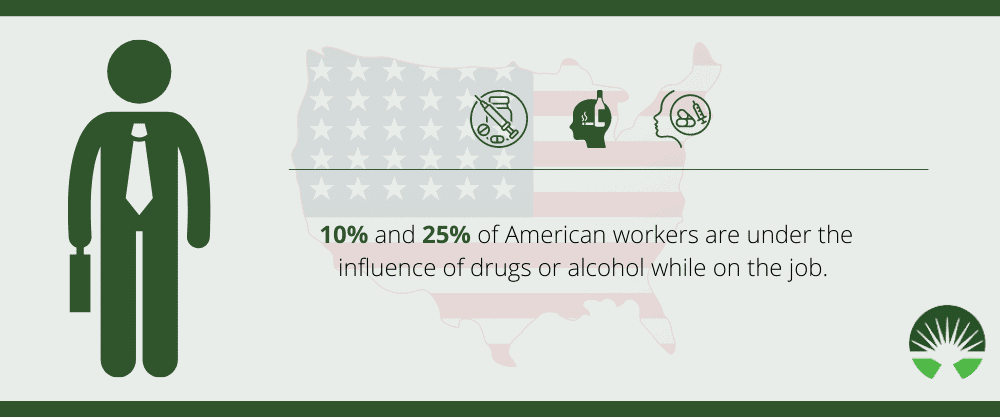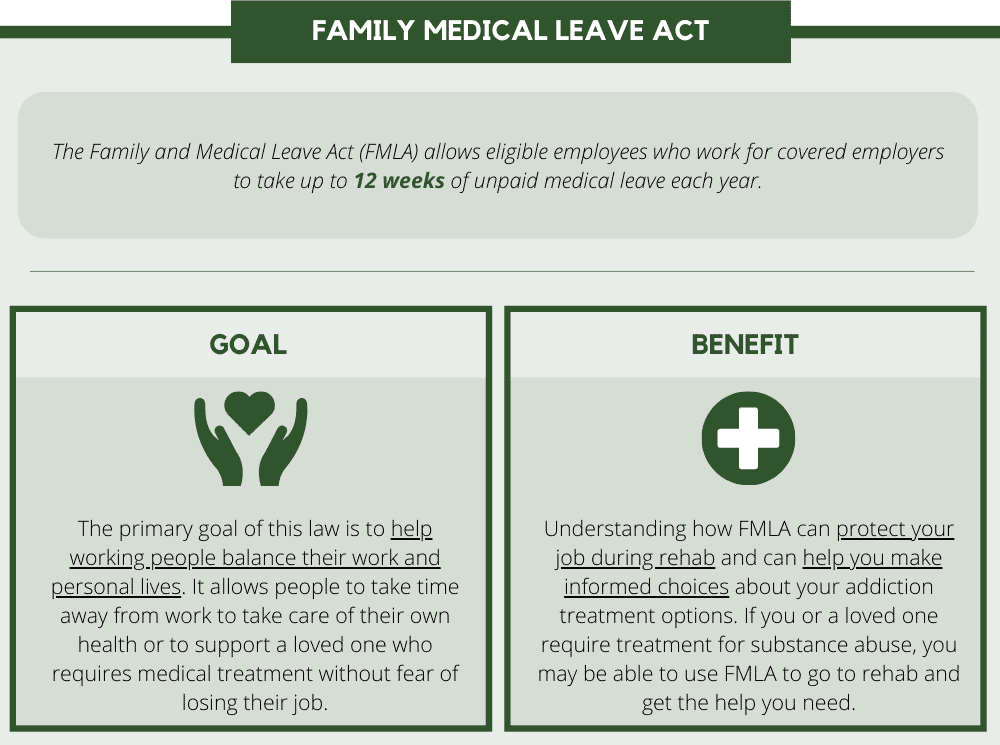There are many reasons why people are hesitant to go to rehab. Some people are worried that they cannot afford treatment, some are in denial that they have a problem, and others simply don’t want to stop using drugs and alcohol. However, one major reason why people avoid going to rehab is because they are afraid they will get fired or lose their job. The good news is, many workplaces have resources available that can help support employees who are seeking treatment for substance abuse. And, there are various federal and state laws in place that may protect certain jobs while taking leave for rehab.
Studies show that between 10% and 25% of American workers are under the influence of drugs or alcohol while on the job.[1] If you are someone who suffers from addiction and uses substances at work, you may find that your addiction stops you from performing your best, causes you to show up late or miss work, or even makes it hard for you to maintain a job at the same place. Fortunately, there are many options available to you that may allow you to keep your job while going to rehab in Massachusetts.

Can My Employer Fire Me for Going to Treatment?
In most circumstances, it is illegal for an employer to fire you for going to rehab. That is because addiction and alcoholism are legitimate medical conditions that qualify for the Family and Medical Leave Act (FMLA) and are protected by the Americans With Disabilities Act (ADA). However, there are some exceptions.
If you have a history of showing up to work under the influence or if your current drug use affects your workability and performance, it may be grounds for termination. And, if you are currently using drugs at the time of your request, an employer can take action against you regarding your drug use. Let’s take a deeper look into FMLA and ADA to help you understand how you can keep your job while going to rehab in Massachusetts.

Understanding the Family and Medical Leave Act (FMLA)
The Family and Medical Leave Act (FMLA) was signed into law by President Bill Clinton in 1993. It gives qualifying employees up to 12 weeks of unpaid leave each year. Most public and private employers with over 50 employees are subject to FMLA, including public, private, and school institutions. You may qualify for FMLA if:
- Your employer is a covered entity that is subject to FML
- You have been employed by your covered employer for atleast 12 months and have worked at least 1,250 hours
- Your employer has 50 or more employees who live within 75 miles of the workplace
While FMLA may prevent your employer from firing you while going to rehab, it does not provide you with paid leave. The time you take off of work will be unpaid unless you are able to apply vacation days or paid time off to your leave.
When requesting family and medical leave, your employer may require a note or referral from a healthcare provider. Absence because of substance abuse instead of for treatment does not qualify for FMLA – only the days spent receiving treatment will qualify.
After completing treatment and returning to work, FMLA protects you from discipline or discrimination at the workplace. Your pay cannot be cut and your position cannot be substantially changed. After your approved leave, your employer is required to return you to the same position at the same pay.[2]
In the rare circumstance that your employer denies your request for FMLA, it is possible that he or she has violated the Americans With Disabilities Act (ADA).

Get The Care You Need and Deserve
Woburn Addiction Treatment is a leader in the addiction treatment field, with proven success in facilitating long-term recovery. Our team of top clinical & medical experts specializes in treating addiction coupled with mental illness, ensuring that each person receives individualized care. Call us – we’re available 24/day, 7 days/week.
Job Protection Under the Americans With Disabilities Act (ADA)
The Americans With Disabilities Act (ADA) makes it illegal for employers to fire, discriminate against, or refuse to hire qualified employees as a result of a physical or mental disability. And, drug and alcohol addiction qualify as disabilities. While current drug or alcohol use is not protected nor considered a disability, people who have quit and are enrolled in a substance abuse treatment program in Massachusetts are protected.
The ADA requires employers to provide reasonable accommodations to individuals who have a disability, and, since substance use disorder qualifies as a disability, your employer must take steps to accommodate your treatment needs.[3] This may involve giving you a more flexible work schedule that allows you to attend outpatient rehab while maintaining employment.
Tips for Keeping Your Job While Going to Rehab in Massachusetts
When the time comes to discuss going to rehab and keeping your job with your boss, it’s important that you know your rights and are properly prepared for the conversation. People with addiction may face stigma and judgment in the workplace, making this conversation very intimidating. However, being honest with your boss about the issue can help them see your problem in a more positive light. Here are some tips on how to approach your boss about keeping your job during rehab.
- Don’t wait until you are facing repercussions in the workplace to tell your boss you need help. If you ask for help before your addiction influences your work, your employer will be more likely to be accommodating.
- Learn about your company’s policies. Ask your Human Resources department if your company offers Employee Assistance Programs (EAPs). EAPs offer treatment referrals and services that can help you balance work with rehab.
- Get your paperwork together. You will likely need a referral from a medical provider and a written request for a leave of absence. Have these things prepared before you speak with your employer.
- Make sure you have a treatment plan ready. The more prepared you are, the better. Tell your employer your plans for leaving work and returning to work so they feel more confident in the proactive steps you are taking.
- Know your rights. This is a good time to review FMLA and the ADA to make sure you know your rights. Some basic points to remember are:
- If you qualify under FMLA, you are entitled to 12 weeks of unpaid leave.
- Your employer CAN drug test you for the illegal use of drugs
- Your employer cannot discriminate against you for struggling with addiction
- Your employer must keep your group health insurance active during FMLA
Last and most importantly, be honest and straightforward with your boss. Lying or beating around the bush won’t get you very far – but your employer will respect your honesty and your drive to improve yourself as an employee.
Get Help With Keeping Your Job and Getting Sober Today
If you are struggling with addiction and are worried about keeping your job while going to rehab in Massachusetts, remember that addiction is progressive and deadly. Continuing to use substances will only result in reduced productivity, problems at work, and ultimately losing your job anyway. And, there are many federal and state laws that protect you and allow you to seek treatment while maintaining employment. As a result, there is no excuse to put off treatment due to your work. It is best that you get the help that you need as soon as possible. Don’t wait any longer. Pick up the phone and contact us today to speak with an addiction specialist in Massachusetts.
References:


